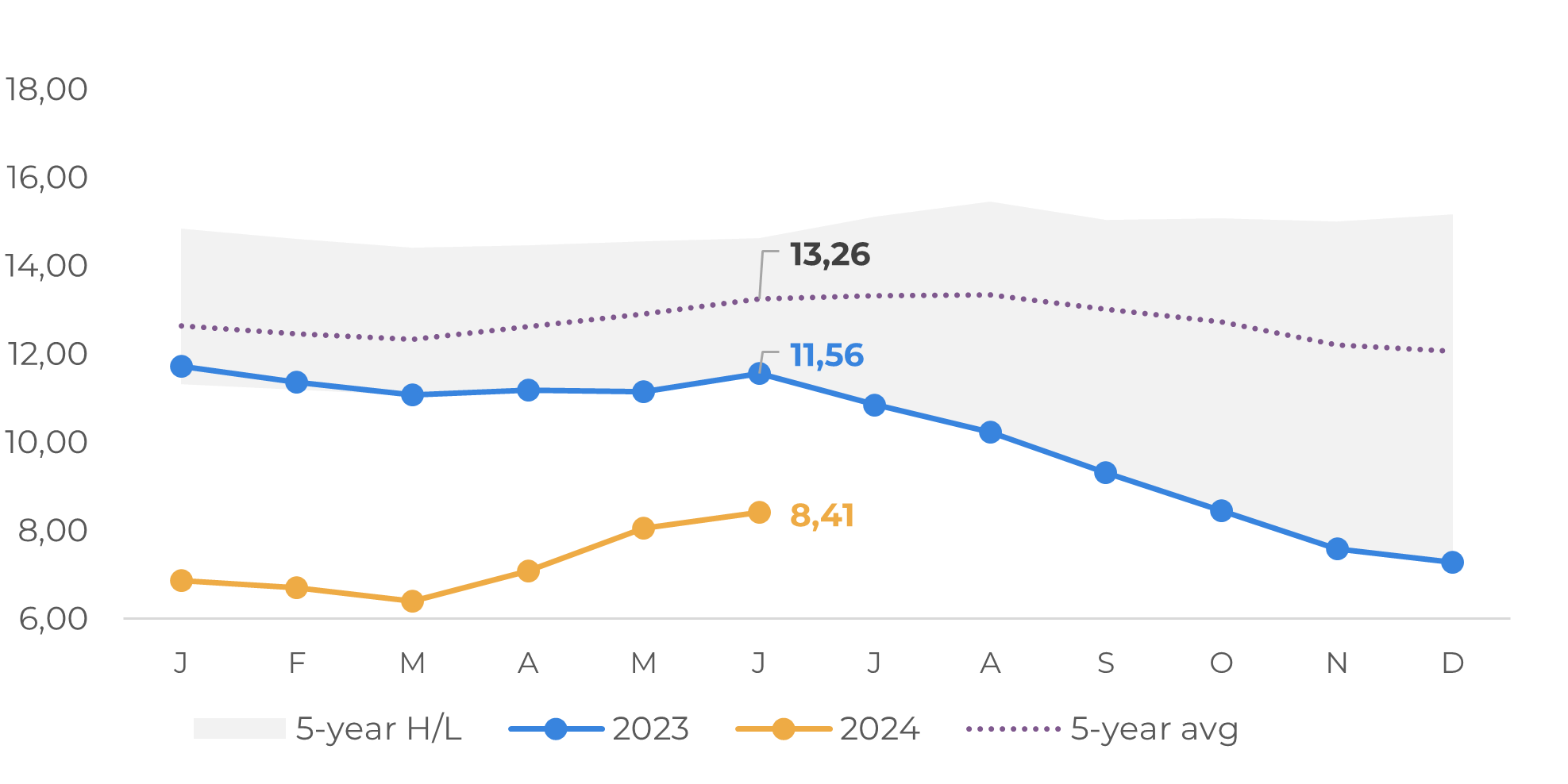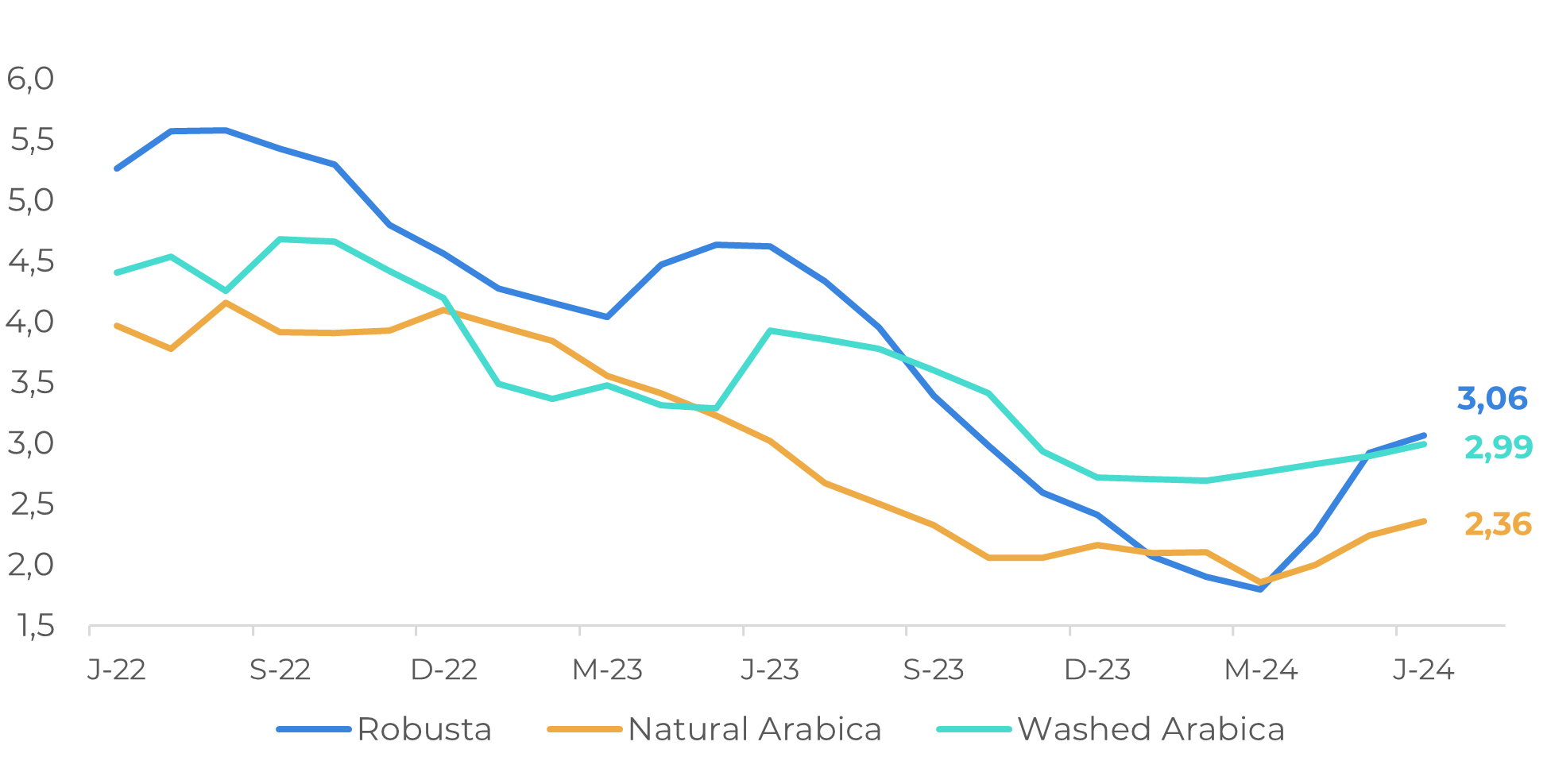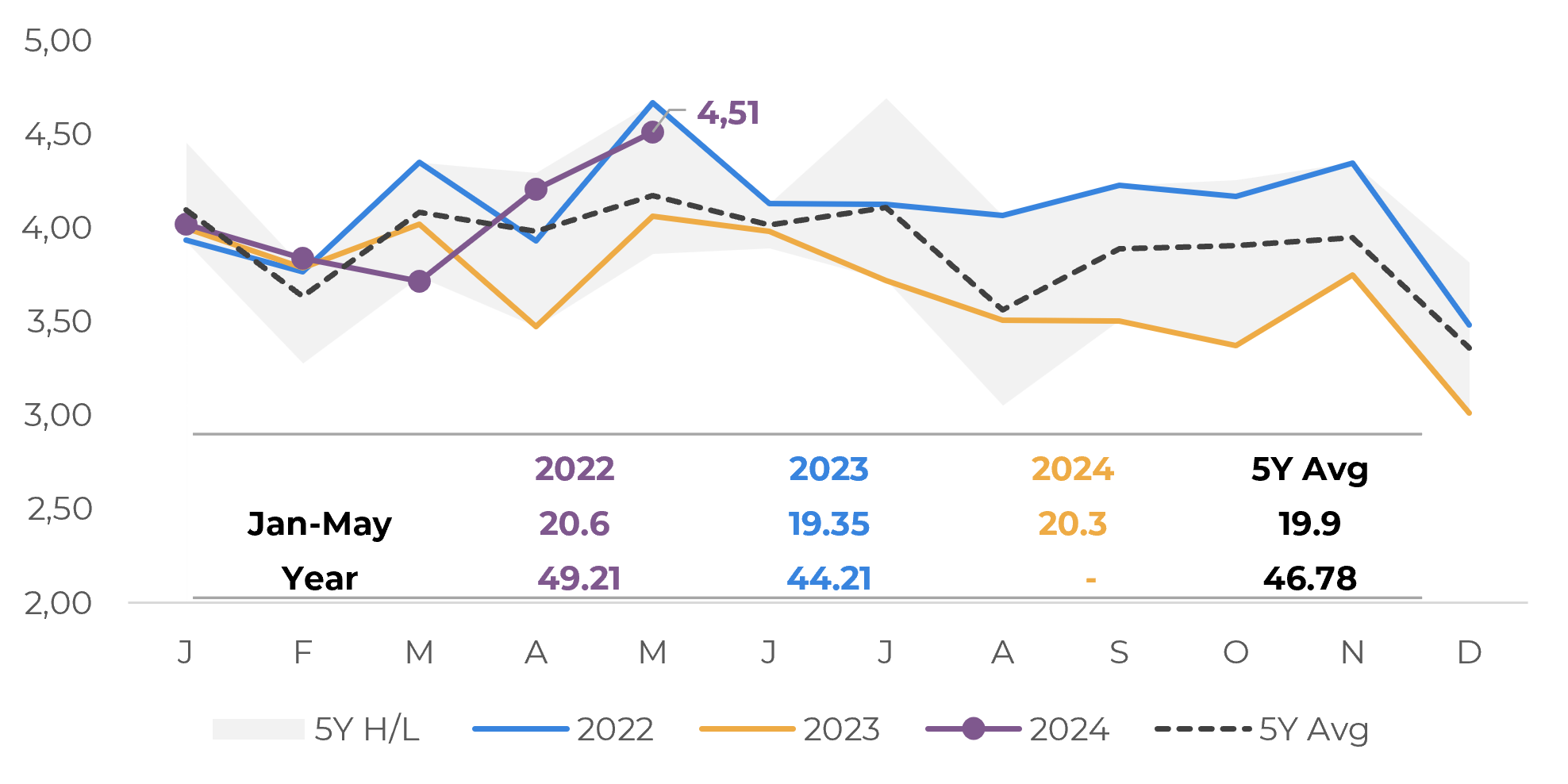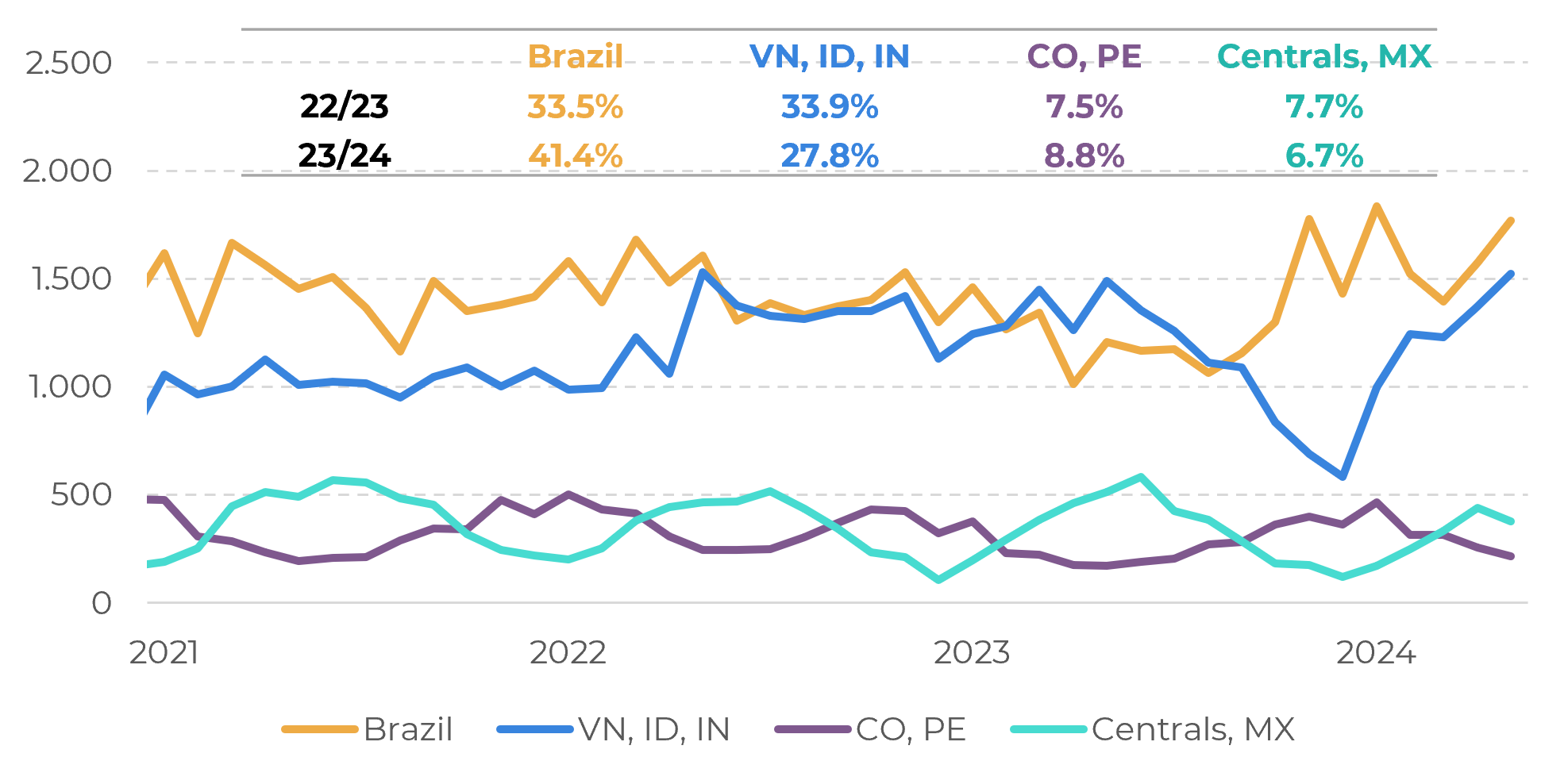
Aug 2
/
Laleska Moda
European Stocks rise in June, but remain bellow historical averages
Back to main blog page
- The European Coffee Federation (ECF) released its stocks report on July 31st, showing an increase in stocks in recent months. However, June stocks (8.41 M bags) remain below the historical average for the period (13.26 M bags), which could support prices in the coming months.
- In terms of type of coffee, both natural and washed Arabica showed a slight increase in the last two months, while the Robusta coffee has a more substation growth. However, stocks for the three types are also below historical levels.
- The reduced stock levels mainly reflect weak imports from the EU between 2023 and early 2024, combined with resilient domestic demand, leading to a rapid decline in inventories between mid-2023 and March/24 to the lowest levels in recent decades.
- Looking at the cumulative figures for 23/24 (Oct/23-May/24), EU imports remain 921.76 K bags below average and 914.82 K bags lower than last year.
- Regarding the origin of the imported coffee, we see a surge in Brazilian beans during the 23/24 European season, mainly due the decrease in imports from Vietnam, India and Indonesia. Meanwhile, for washed arabica, there has been an increase in the import shares from Colombia and Peru, to compensate the drop in Centrals and Mexico.
European Stocks rise in June, but remain bellow historical averages
This week, the European Coffee Federation (ECF) released stock figures up to June, showing a strong increase of 1.33 M bags compared to April (+18.8%) - the last reported number - to reach 8.41 M bags. However, European June figures are still 3.15 M bags below Jun/23, a significant drop of 27.3%. Compared to the historical average for this period (13.26 M bags), the decrease is even greater, at 4.85 M bags or -36.5%.
This trend was also observed by coffee type, with robusta, natural and washed Arabica stocks well below historical levels in June. Compared to the April data, all types showed an increase, with robusta having a stronger recovery trend with an advance of 35.7%, while natural and washed arabica increased by 18.1% and 5.7% respectively.
The lower numbers mainly reflect weaker imports from 2023 to early 2024, combined with resilient demand that has led to a reduction in European inventories since last year, reaching its lowest level in March/24, at 6.4 M bags. Cumulative imports figures for the 23/24 season (Oct/23-May/24) in the EU are still 921.76 K bags below the average levels of the last 5 years and 914.82 K bags less than the volume reported during the same period in the last cycle. On the other hand, apparent consumption is almost 360 K bags above the historical average.
European Coffee Federation Stocks (M bags)

Source: ECF
European Coffee Federation - Stocks per Type (M bags)

Source: ECF
On the other hand, its good to notice that the trend for the last months has been of an increase of imports, with 2024 cumulated figures, reaching 20.3 M bags until May, a lightly increase of 1.6% from the historical averages and up 4.9% from the same period of 2023. The scenario of lower stocks may also mean that European countries will continue to export more in the coming months, which could also support coffee prices
European Union – Green Coffee Imports (M bags)

Source: Eurostat, Hedgepoint
European Union – Imports by Country/Group (‘000 bags)

Source: Eurostat, Hedgepoint
Regarding the coffee imports origins, some interesting trends can be observed when looking at the 23/24 cycle. In the period from Oct/22 to May/23 (22/23 season) the imports from Vietnam, Indonesia, and India accounted for 33.9% of the total volume, however, in the same period of 23/24, this share fell to 27.8%. This behavior was to be expected given the crop failures in Vietnam and Indonesia in 23/24. While there was some reaction in the last months of 2024, European imports from these countries may continue to be at the lower end, especially given the limited stocks in Vietnam. The slow start of exports from Indonesia could also contribute to this scenario, even if a higher crop is expected in 24/25.
On the other hand, this scenario favors Brazilian exports to the region. While in 22/23 Brazilian beans accounted for 33.5% of total European imports by May/23, this figure rose to 41.4% in 23/24. Brazilian export data in recent months have also shown an increase in shipments of arabica and especially robusta to the EU, due to the decline in Southeast Asia. Brazilian shipments to the EU are therefore expected to remain high in 2024, especially in the case of conilon.
In the case of washed arabica, imports from Central America and Mexico declined steadily up January of this year, but this was offset by an increase in the share of Colombian and Peruvian coffees.
In Summary
The recent increase in ECF stocks is in line with historical seasonality, but also reflects changes in trade flows compared to the second half of 2023. In this case, it is important to highlight the increase in Brazilian shipments to the EU, given the supply limitations in Southeast Asia. Robusta imports have also shown a more significant improvement compared to the arabica types, highlighting the resilient demand of the former.
Nevertheless, European stocks remain well below historical averages – mainly reflecting lower imports in 23/24, so far – and could be a bullish point in the short to medium term. It is good to note, however, that as soon as the destinations start to reduce the benchmark rates, these stocks could become a bearish fundamental in the future.
Weekly Report — Coffee
Written by Laleska Moda
laleska.moda@hedgepointglobal.com
Reviewed by Thais Italiani
thais.italiani@hedgepointglobal.com
thais.italiani@hedgepointglobal.com
www.hedgepointglobal.com
Disclaimer
This document has been prepared by Hedgepoint Global Markets LLC and its affiliates (“HPGM”) solely for informational and instructional purposes, without the purpose of instituting obligations or commitments to third parties, nor is it intended to promote an offer, or solicitation of an offer of sale or purchase relating to any securities, commodities interests or investment products. Hedgepoint Commodities LLC (“HPC”), a wholly owned entity of HPGM, is an Introducing Broker and a registered member of the National Futures Association. The trading of commodities interests such as futures, options, and swaps involves substantial risk of loss and may not be suitable for all investors. Past performance is not necessarily indicative of future results. Customers should rely on their own independent judgement and outside advisors before entering in any transaction that are introduced by the firm. HPGM and its associates expressly disclaim any use of the information contained herein that directly or indirectly result in damages or damages of any kind. In case of questions not resolved by the first instance of customer contact (client.services@hedgepointglobal.com), please contact our internal ombudsman channel (ombudsman@hedgepointglobal.com) or 0800-878- 8408/ouvidoria@hedgepointglobal.com (only for customers in Brazil)
Contact us
hedgepointhub.support@hedgepointglobal.com
ouvidoria@hedgepointglobal.com
Funchal Street, 418, 18º floor - Vila Olímpia São Paulo, SP, Brasil
This page has been prepared by Hedgepoint Schweiz AG and its affiliates (“Hedgepoint”) solely for informational and instructional purposes, without the purpose of instituting obligations or commitments to third parties, nor is it intended to promote an offer, or solicitation of an offer of sale or purchase relating to any securities, commodities interests or investment products. Hedgepoint and its associates expressly disclaim any use of the information contained herein that directly or indirectly result in damages or damages of any kind. Information is obtained from sources which we believe to be reliable, but we do not warrant or guarantee the timeliness or accuracy of this information. The trading of commodities interests such as futures, options, and swaps involves substantial risk of loss and may not be suitable for all investors. You should carefully consider wither such trading is suitable for you in light of your financial condition. Past performance is not necessarily indicative of future results. Customers should rely on their own independent judgement and/or advisors before entering in any transaction.Hedgepoint does not provide legal, tax or accounting advice and you are responsible for seeking any such advice separately.Hedgepoint Schweiz AG is organized, incorporated, and existing under the laws of Switzerland, is filiated to ARIF, the Association Romande des Intermédiaires Financiers, which is a FINMA-authorized Self-Regulatory Organization. Hedgepoint Commodities LLC is organized, incorporated, and existing under the laws of the USA, and is authorized and regulated by the Commodity Futures Trading Commission (CFTC) and a member of the National Futures Association (NFA) to act as an Introducing Broker and Commodity Trading Advisor. HedgePoint Global Markets Limited is Regulated by the Dubai Financial Services Authority. The content is directed at Professional Clients and not Retail Clients. Hedgepoint Global Markets PTE. Ltd is organized, incorporated, and existing under the laws of Singapore, exempted from obtaining a financial services license as per the Second Schedule of the Securities and Futures (Licensing and Conduct of Business) Act, by the Monetary Authority of Singapore (MAS). Hedgepoint Global Markets DTVM Ltda. is authorized and regulated in Brazil by the Central Bank of Brazil (BCB) and the Brazilian Securities Commission (CVM). Hedgepoint Serviços Ltda. is organized, incorporated, and existing under the laws of Brazil. Hedgepoint Global Markets S.A. is organized, incorporated, and existing under the laws of Uruguay. In case of questions not resolved by the first instance of customer contact (client.services@Hedgepointglobal.com), please contact internal ombudsman channel (ombudsman@hedgepointglobal.com – global or ouvidoria@hedgepointglobal.com – Brazil only) or call 0800-8788408 (Brazil only).Integrity, ethics, and transparency are values that guide our culture. To further strengthen our practices, Hedgepoint has a whistleblower channel for employees and third-parties by e-mail ethicline@hedgepointglobal.com or forms Ethic Line – Hedgepoint Global Markets.Security note: All contacts with customers and partners are conducted exclusively through our domain @hedgepointglobal.com. Do not accept any information, bills, statements or requests from different domains and pay special attention to any variations in letters or spelling, as they may indicate a fraudulent situation.“HedgePoint” and the “HedgePoint” logo are marks for the exclusive use of HedgePoint and/or its affiliates. Use or reproduction is prohibited, unless expressly authorized by HedgePoint. Furthermore, the use of any other marks in this document has been authorized for identification purposes only. It does not, therefore, imply any rights of HedgePoint in these marks or imply endorsement, association or seal by the owners of these marks with HedgePoint or its affiliates.

